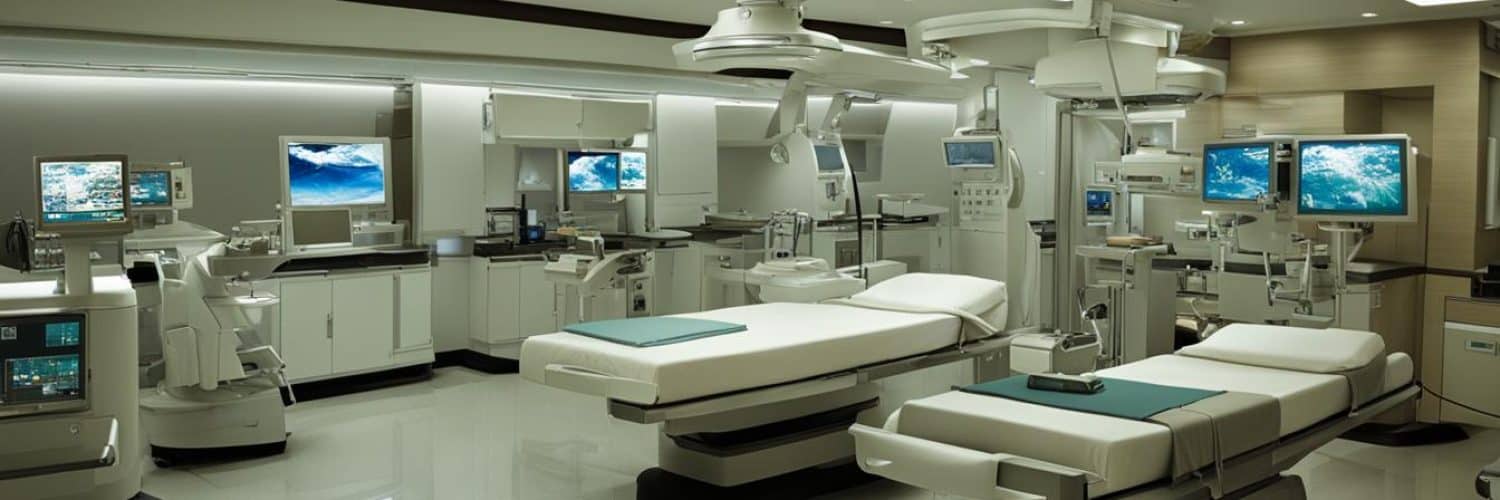Are you considering traveling abroad for medical treatments? Look no further than the Philippines. Known for its healthcare tourism, the Philippines has become a popular destination for medical tourists seeking quality healthcare services at affordable prices.
According to the Medical Tourism Association (MTA) and the International Healthcare Research Center, the Philippines is ranked among the top medical tourism destinations in the world. With 80,000 to 250,000 medical tourists visiting annually, the country attracts visitors from all over the globe, including Sri Lanka, East Asia, the Gulf States, Europe, North and South America, and the Pacific Islands.
What makes the Philippines an ideal choice for medical travel? The country boasts modern medical facilities, English-speaking healthcare providers, and a caring local community that contributes to the well-being of patients seeking medical treatments. The Department of Tourism and private medical institutions, such as St. Luke’s Medical Center, actively promote medical tourism in the country.
If you’re looking for high-quality medical treatments combined with an enriching cultural experience, the Philippines is the perfect destination for you. With its affordable healthcare services and a focus on holistic healing, the country offers a unique and satisfying healthcare tourism experience.
Key Takeaways:
- The Philippines is ranked among the top medical tourism destinations in the world.
- The country offers modern medical facilities and English-speaking healthcare providers.
- The Department of Tourism and private medical institutions actively promote medical tourism in the Philippines.
- Medical treatments in the Philippines are significantly more affordable compared to Western countries.
- The Philippines provides a unique and satisfying healthcare tourism experience.
Philippines as a Medical Tourism Destination
The Philippines is quickly gaining recognition as a sought-after medical tourism destination, offering a combination of affordable healthcare services and high-quality medical treatments. Patients from around the world, including international travelers, expatriates, and overseas Filipino workers, are drawn to the country for its exceptional medical expertise. With its close proximity to major Asian cities, the Philippines provides easy accessibility for international patients seeking advanced medical care.
One of the key advantages of choosing the Philippines as a medical tourism destination is the availability of English-speaking medical professionals. This ensures effective communication between patients and healthcare providers, eliminating language barriers and allowing for a seamless healthcare experience.
Additionally, the Philippines has a strong focus on holistic healing, providing a comprehensive approach to patient care. The country’s healthcare facilities offer a wide range of medical treatments and services, including advanced procedures in areas such as cardiology, ophthalmology, cosmetic surgery, and orthopedics.
To support the growing demand for medical tourism, the Philippines’ Department of Tourism and various medical tourism companies are collaborating to establish comprehensive medical tourism packages. These packages cater to the needs of international patients, providing them with convenient and well-organized healthcare solutions.
| Criteria | Philippines | Country X |
|---|---|---|
| Affordability | ✓ | ✓ |
| Quality of Healthcare | ✓ | ✗ |
| English-Speaking Professionals | ✓ | ✓ |
| Proximity to Major Cities | ✓ | ✗ |
Overall, the Philippines offers a unique and attractive medical tourism experience, combining cost-effective healthcare services, highly skilled medical professionals, and a focus on holistic healing. As international patients increasingly recognize the country’s potential, the Philippines is well-positioned to continue its growth as a leading medical tourism destination.
Reputation of Medical Tourism in the Philippines
The Philippines has established a strong reputation for delivering exceptional medical care and a wide range of advanced medical procedures. Renowned for its excellence in cosmetic surgery, dental procedures, ophthalmology, cardiology, and orthopedics, the country offers comprehensive healthcare options for both local and international patients.
The Philippines is home to a number of top hospitals, ensuring high-quality services and modern medical facilities. Among them are:
- St. Luke’s Medical Center
- Makati Medical Center
- Cebu Doctors’ University Hospital
These top hospitals in the Philippines attract patients seeking medical treatments due to their exceptional reputation and expertise in their respective fields.
“The Philippines offers world-class medical care and a wide range of medical procedures, making it a sought-after destination for medical tourism.” – Dr. Maria Perez, renowned cosmetic surgeon.
The exceptional reputation of the Philippines in medical tourism is further strengthened by the international accreditation received by many private hospitals in the country. This accreditation ensures that these hospitals adhere to rigorous standards, providing patients with high-quality healthcare services.
Furthermore, the country’s top hospitals offer state-of-the-art equipment and facilities, allowing for the implementation of advanced medical procedures. With a focus on patient care, these hospitals prioritize the well-being and satisfaction of their patients.
Whether it’s cosmetic procedures, dental treatments, eye surgeries, heart treatments, or orthopedic surgeries, the Philippines has gained recognition for its world-class medical services, attracting patients from around the globe.
Quality and Safety in Medical Tourism in the Philippines
When it comes to medical tourism, quality and safety are of utmost importance. In the Philippines, medical institutions prioritize international standards of medical practice and safety protocols to ensure the highest level of care for patients.
Many hospitals in the country have received accreditation from international healthcare standard organizations, such as Joint Commission International (JCI) and Healthcare Accreditation Institute (HAI). These accreditations guarantee that the hospitals meet rigorous quality standards and adhere to strict safety protocols.
The Department of Health and the Philippine Health Insurance Corporation also play a crucial role in monitoring and maintaining healthcare standards across the country. Their continuous oversight and collaboration with medical institutions help ensure that patients receive the best possible care.
In addition to these measures, patients in the Philippines have specific rights that protect their well-being. They have the right to informed consent, ensuring that they fully understand the nature of their treatment before proceeding. Privacy is also respected, and healthcare providers prioritize patient autonomy, allowing individuals to accept or refuse treatment based on their preferences.
Overall, the healthcare system in the Philippines places a strong emphasis on quality and safety in medical tourism. Patients can be confident that they will receive top-notch care from reputable hospitals that prioritize patient well-being.
“The Philippines offers a unique combination of modern medical facilities, highly skilled healthcare professionals, and warm hospitality, ensuring a safe and satisfactory experience for medical tourists.” – Dr. Maria Santos, Chief Medical Officer at St. Luke’s Medical Center
Cost of Medical Tourism in the Philippines
One of the key advantages of choosing medical tourism in the Philippines is the significantly lower cost of medical procedures compared to Western countries. Patients can expect to save between 40% to 80% on medical costs for a wide range of treatments and procedures. Whether it’s heart bypass surgery, cosmetic surgery, dental implants, or any other medical procedure, the affordability of healthcare services in the Philippines is a major draw for international patients seeking quality medical treatments.
This cost advantage can be attributed to the lower cost of living in the country, which translates to lower overhead expenses for medical institutions. As a result, patients can enjoy the same high standards of healthcare at a fraction of the price compared to their home countries.
It’s important to note that the cost of medical treatments in the Philippines can vary depending on factors such as the complexity of the procedure and the reputation of the medical institution. However, even with these variations, patients can still expect significant savings compared to their home countries.
Overall, the affordability of healthcare services in the Philippines makes it an attractive destination for medical tourists seeking quality medical procedures at a fraction of the cost. Whether it’s a life-saving surgery or an elective procedure, patients can benefit from the affordability of medical tourism in the Philippines.
Popular Medical Procedures in the Philippines
The Philippines is renowned for its expertise in various medical procedures, making it an attractive destination for medical tourists seeking quality healthcare services. The top hospitals in the country offer specialized services and advanced technologies in fields such as cosmetic surgery, dental procedures, ophthalmology, cardiology, and orthopedics.
One of the popular medical procedures in the Philippines is rhinoplasty, commonly known as a nose job. It is a cosmetic procedure that helps enhance the appearance of the nose, improve breathing, or correct any nasal deformities. Skilled plastic surgeons in the Philippines utilize state-of-the-art techniques to achieve desirable results for their patients.
Breast augmentation is another sought-after procedure among medical tourists. This surgical procedure enhances the size and shape of the breasts, improving overall body proportions and boosting self-confidence. With experienced cosmetic surgeons and modern medical facilities, the Philippines provides safe and effective breast augmentation procedures.
Dental procedures, including dental implants, are also popular in the Philippines. The country is known for its exceptional dental services, attracting patients seeking high-quality and affordable oral care. Dental implants replace missing teeth and provide a natural-looking and long-lasting solution for patients.
Additionally, the Philippines is an ideal destination for Lasik eye surgery. The procedure corrects vision problems, such as nearsightedness, farsightedness, and astigmatism, reducing the dependence on glasses or contact lenses. Advanced eye clinics in the country utilize cutting-edge technology to ensure precise and safe Lasik eye surgery.
These top hospitals in the Philippines, such as St. Luke’s Medical Center, Makati Medical Center, and Cebu Doctors’ University Hospital, specialize in these procedures, delivering exceptional outcomes and satisfying patients from around the world.
| Medical Procedure | Top Hospitals in the Philippines |
|---|---|
| Rhinoplasty | St. Luke’s Medical Center, Makati Medical Center |
| Breast Augmentation | Cebu Doctors’ University Hospital, St. Luke’s Medical Center |
| Dental Implants | Makati Medical Center, Cebu Doctors’ University Hospital |
| Lasik Eye Surgery | St. Luke’s Medical Center, Makati Medical Center |
Medical Visa Information for Medical Tourism in the Philippines
Foreign patients seeking medical treatments in the Philippines may require a medical visa for a longer stay. The application process typically involves providing a valid passport, financial capability to pay for medical services, and medical documents substantiating the need for treatment.
The medical visa allows for an initial stay of up to two months, with the possibility of extension if necessary. It is advisable to check for travel advisories and any specific requirements related to health and safety before planning a medical trip to the Philippines.
Planning a visit to the Philippines for medical procedures requires some important considerations. Foreign patients will need to obtain a medical visa, ensuring a longer stay in the country to complete their treatments. The application process requires a valid passport, evidence of financial capability to cover medical expenses, and supporting medical documents that justify the need for treatment.
The medical visa allows patients to initially stay in the Philippines for up to two months. However, it is important to note that the visa can be extended if necessary, ensuring patients have adequate time for their medical journey. It is advisable to stay informed about any travel advisories and specific health and safety requirements related to visiting the Philippines.
By understanding and fulfilling the necessary visa requirements, medical tourists can confidently plan their trip to the Philippines for healthcare purposes. The country’s renowned medical facilities and expertise, coupled with a relaxing and welcoming environment, makes it an ideal destination for medical travel.
Healthcare System and Accredited Hospitals in the Philippines
The healthcare system in the Philippines offers a comprehensive range of services through both private and public hospitals, as well as barangay health centers. When it comes to healthcare services, private hospitals, especially those located in major cities like Manila and Cebu, are known for their exceptional quality of care and state-of-the-art facilities. These hospitals have gained recognition for their commitment to patient well-being and have received accreditation from international healthcare standard organizations, ensuring the provision of top-notch medical services to patients.
One of the most prestigious and trusted medical institutions in the country is St. Luke’s Medical Center, which boasts a long-standing reputation for excellence in healthcare. Accredited hospitals like St. Luke’s Medical Center are equipped with advanced technologies and staffed by expert medical professionals who are dedicated to providing the highest level of care to patients.
In addition to private hospitals, the Philippines also has a robust public healthcare system, which includes government-run hospitals and barangay health centers. These facilities aim to provide accessible healthcare services to the local population, ensuring that everyone has access to basic medical care.
| Hospital | Location | Accreditation |
|---|---|---|
| St. Luke’s Medical Center | Manila | Joint Commission International (JCI) Accreditation |
| Makati Medical Center | Makati | Joint Commission International (JCI) Accreditation |
| Cebu Doctors’ University Hospital | Cebu | Joint Commission International (JCI) Accreditation |
Considerations for Medical Tourists in the Philippines
When planning a medical trip to the Philippines, international patients should take various factors into consideration to ensure a smooth and successful experience. Here are some important considerations for medical tourists:
Language Barriers:
English is widely spoken in medical institutions in the Philippines, which makes communication easier for international patients. However, it is still crucial to ensure clear and effective communication with healthcare providers. If necessary, patients can request interpreters or translators to assist them during consultations and medical procedures.
Legal and Ethical Considerations:
International patients should familiarize themselves with the legal rights and protections available to them in the Philippines. It is important to understand the local laws regarding medical malpractice and the avenues for seeking legal recourse, should the need arise. Patients are encouraged to review their rights and responsibilities beforehand to ensure a favorable medical experience.
Post-Procedure Care and Rehabilitation:
After undergoing medical procedures in the Philippines, it is essential for patients to have access to proper post-procedure care and rehabilitation options. The country is home to top-quality rehabilitation centers, particularly in urban areas like Manila and Cebu. These centers provide comprehensive care and support to aid patients in their recovery process.
Quotes:
“The language barrier can be overcome easily as most medical professionals in the Philippines speak English fluently. However, it’s always helpful to communicate your concerns clearly and seek clarification if needed.” – Dr. Maria Santos, General Surgeon, St. Luke’s Medical Center.
Medical Tourism Companies in the Philippines
| Company Name | Services Offered | Contact Information |
|---|---|---|
| MediTour | Facilitates medical appointments, travel arrangements, and accommodation for international patients | Phone: +63 2 1234567 Email: in**@******ur.com Website: www.meditour.com |
| Philippine Medical Tourism, Inc. | Provides medical travel coordination and assistance, hospital referrals, and visa application support | Phone: +63 2 9876543 Email: in**@**********************sm.com Website: www.philippinemedicaltourism.com |
| Asia Global Health | Offers a wide range of medical tourism services, including consultations, treatments, and follow-up care | Phone: +63 2 5554321 Email: in**@**************th.com Website: www.asiaglobalhealth.com |
It is advisable for medical tourists to consult with reputable medical tourism companies in the Philippines to facilitate their medical journey and ensure a seamless experience. These companies specialize in arranging medical appointments, travel logistics, and accommodation for international patients.
By considering these factors and availing the services of trusted medical tourism companies, international patients can benefit from the quality medical services and the relaxing environment that the Philippines offers.
Conclusion
Medical tourism in the Philippines is on the rise, and for good reason. The country offers high-quality healthcare services at affordable prices, making it an attractive destination for those seeking medical treatments. With a strong reputation for excellence in various medical procedures and a healthcare system that meets international standards, patients can feel confident in the care they receive.
One of the key advantages of choosing the Philippines for medical tourism is the availability of English-speaking healthcare professionals. Communication plays a vital role in the patient experience, and patients can rest assured that language barriers will not hinder their interactions with doctors and medical staff.
In addition to the medical expertise, the Philippines offers a warm and hospitable culture that contributes to the overall satisfaction of medical tourists. Patients can experience not only quality healthcare but also a supportive and caring environment during their stay.
Overall, medical tourism in the Philippines provides a holistic and satisfying experience for patients. The combination of affordable prices, top-notch medical procedures, English-speaking healthcare professionals, and a welcoming culture make the Philippines an excellent choice for those seeking healthcare tourism.
FAQ
What makes the Philippines a popular destination for medical tourism?
The Philippines offers affordable healthcare services, modern medical facilities, English-speaking healthcare providers, and a caring local community, making it an attractive choice for medical tourists.
What are the top medical procedures in the Philippines?
The Philippines is known for its excellence in cosmetic surgery, dental procedures, ophthalmology, cardiology, and orthopedics.
Are the medical institutions in the Philippines safe and of high quality?
Yes, many hospitals in the Philippines have received international accreditation, ensuring high-quality services and adherence to international standards of medical practice and safety protocols.
How affordable are medical procedures in the Philippines compared to Western countries?
Medical procedures in the Philippines are significantly more affordable, with potential savings of 40-80% compared to Western countries.
What are the most popular medical procedures for international patients in the Philippines?
Rhinoplasty, breast augmentation, dental implants, and Lasik eye surgery are among the popular medical procedures sought by international patients in the Philippines.
Do foreign patients require a medical visa to seek treatment in the Philippines?
How is the healthcare system in the Philippines? Are there accredited hospitals?
The Philippines has a healthcare system that includes private and public hospitals. Many private hospitals in the country, like St. Luke’s Medical Center, have received accreditation from international healthcare standard organizations, ensuring the provision of quality healthcare.
What considerations should medical tourists keep in mind while seeking treatment in the Philippines?
Medical tourists should consider factors such as language barriers, legal and ethical considerations, and post-procedure care. It is important to ensure clear communication with healthcare providers, understand legal rights, and have access to rehabilitation options for post-procedure care.
How does medical tourism in the Philippines contribute to the overall healthcare sector?
Medical tourism in the Philippines boosts the country’s healthcare sector by attracting international patients, providing employment opportunities, and promoting economic growth.
Why should one choose the Philippines for medical tourism?
The Philippines offers quality healthcare services at affordable prices, has a reputation for excellence in medical procedures, and provides a unique experience with English-speaking healthcare professionals in a welcoming and relaxing environment.







Add comment